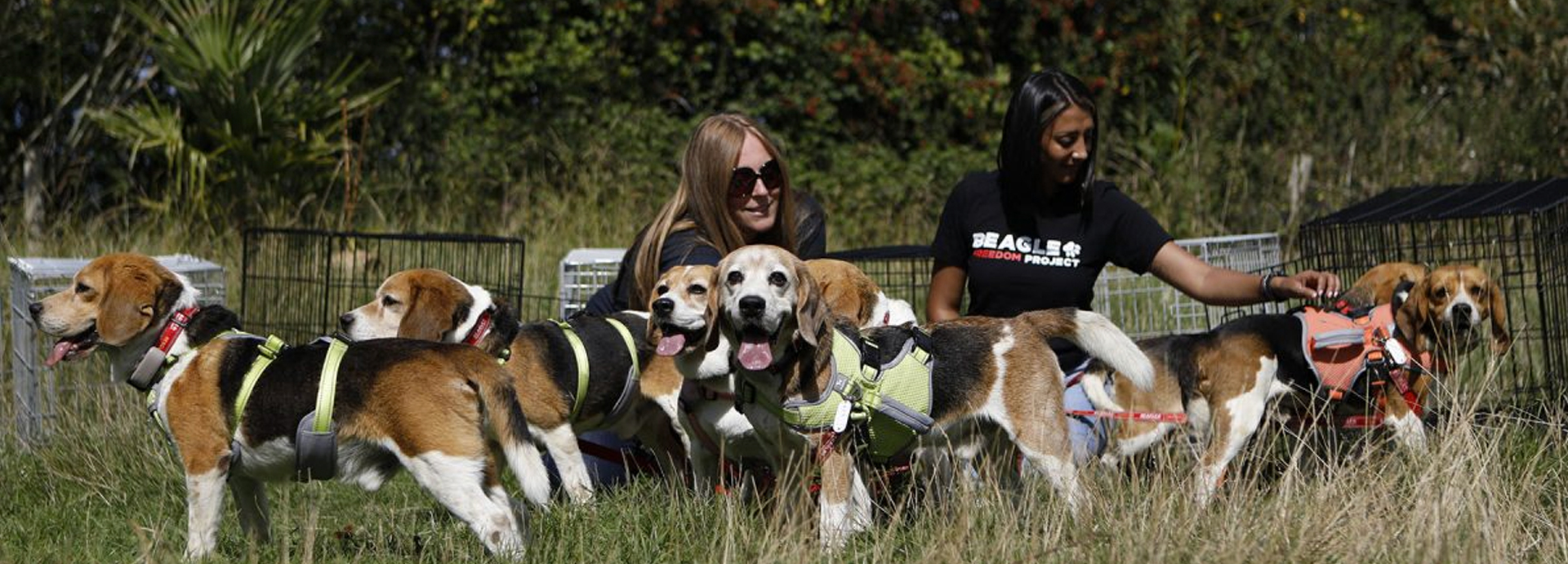Seven beagles born and used in an animal testing facility in Spain, this week, got to leave their cages forever and taste freedom.
Beagle Freedom Project UK (BFP UK) had successfully negotiated the release of the beagles from the facility only a few days earlier. The dogs were held by BFP partners in a sanctuary in Spain, where vets health-checked the dogs and prepared them for their freedom ride. A designated transporter drove them to The Retreat, an animal sanctuary in Kent, where the dogs felt grass under their feet for the first time.
No longer a number, all dogs have been named: the five boys are called Jonesy, Davey, Ringo, who are 11 years old, and brothers Elton and Freddie, and the two girls are Olivia and Birdie. The youngest one is believed to be seven years old.
All these beagles have dermatitis, three have had surgery for ruptured cruciate ligament, and they are all suffering from very bad dental hygiene. It is unlikely that any of these dogs have ever been outside.
Ahead of their stepping out of the kennels at The Retreat, the BFP UK team put trackers around their necks, in case one got spooked and ran off. Thankfully, none of the newly freed dogs had a desire to explore the sanctuary further than planned. Instead, they confidently walked on the grass, sniffed each other and greeted the adoring humans. As time went on, the dogs became more confident in exploring the grounds, some rolled in the grass, had a good drink and enjoyed the kind company.
A behaviourist and a vet from The Retreat were on hand to check the dogs through and calm anyone with anxiety. Only one boy, Elton, seemed to be unsure, but eventually he, too, sniffed around the hedges. Elton’s foster carer was also among the small crowd gathered to witness the freedom strides, and he drove Elton and his brother Freddie to the Midlands where they met the other fosterers. The other five dogs travelled in a separate van together with BFP associate Samantha Kester and volunteers.
“The foster carers role is to prepare the dog for their forever home, but this isn’t an easy task,” Sam explained. “The dogs are newborns in adult bodies, with many suffering from PTSD. And they need to learn the most basic things like being toilet trained and walking on a lead.
“Foster carers are interviewed, along with home and reference checks, as we need to be certain that they can handle the responsibilities and have the patience required. We don’t want the dogs to be abandoned or go through more trauma.
“We offer full support including training, and plan, and pay for all of the veterinary visits to help smooth the transition, and require a ‘normal’ well-adjusted dog already in the home to help teach the rescue how to be a dog. Once a foster is approved, we match them with a dog, and the rescue release is often the first time they meet, which is always an exciting time.”
Beagle Freedom Project UK’s rescue efforts extend beyond the physical liberation of animals and placing them in foster care and forever homes; the NGO also works on education, advocacy, and legislation to put an end to the use of animals in experimental research. Since its inception in the USA in 2010, BFP has made significant strides in rescuing more than 3,000 dogs and raising awareness about the ethical implications of animal testing.
In the US, BFP has also successfully got the Beagle Freedom Bill signed into law in 14 states (and counting). The bill requires labs to release dogs at the end of their ‘useful’ lives to charities so that the dogs can be rehomed instead of killed.
At the launch of BFP’s UK branch in May, BFP founder Shannon Keith invited XCellR8 co-founder and CEO Carole Treasure to speak about whether animal testing was still scientifically relevant. Carole explained that some animal testing protocols are 100 years old and that more than 90% of animal tests fail in human applications. Instead, labs such as XCellR8 are developing non-animal testing methods. Together with BFP, Carole is working to lobby the government to end animal testing and require the science community to switch to non-animal methods.
Original Source: Wunderdog
